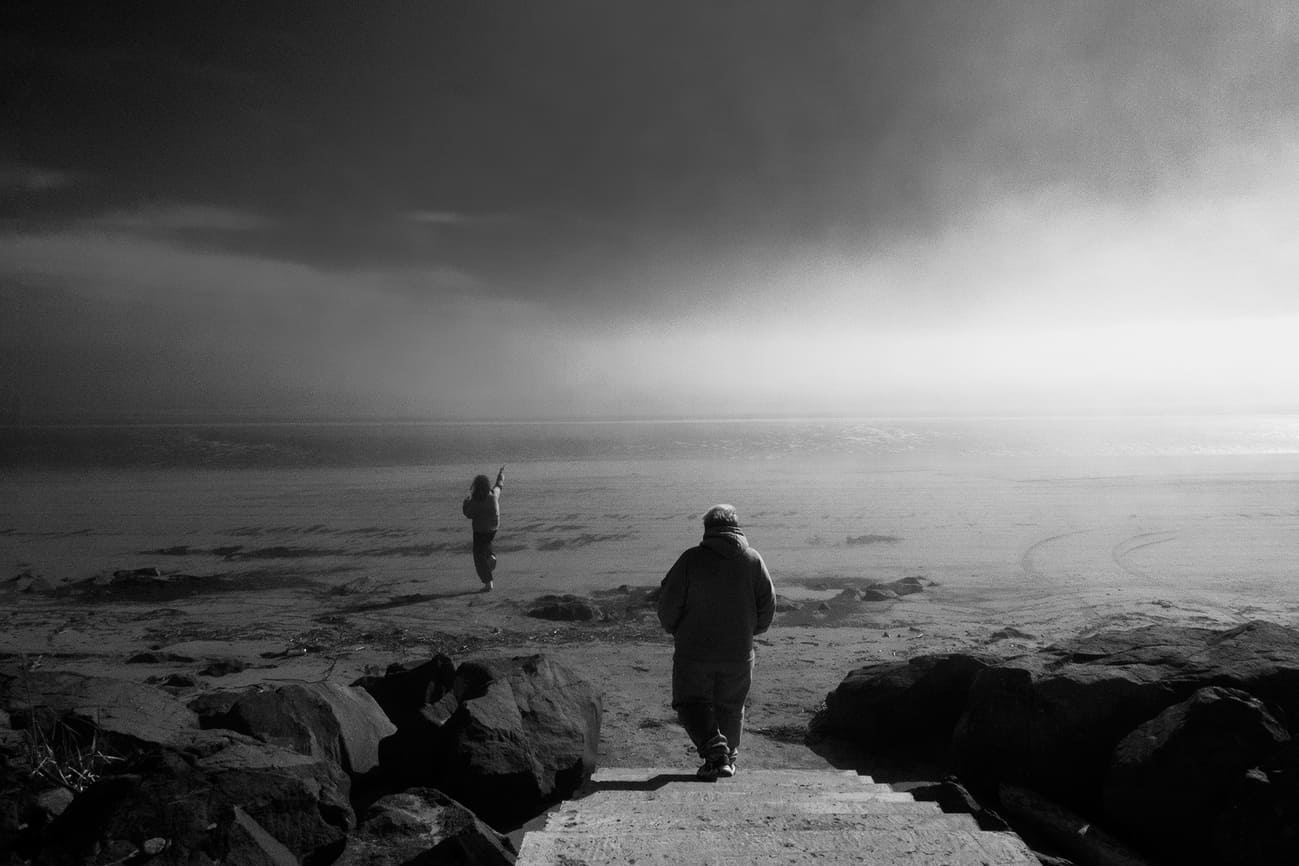
How does one drain a flooded cellar? Why did my husband leave to kill other people? Who will mow the grass in the yard now? What am I going to tell children about the front? How much does a bulletproof vest cost? Can I trust the news from Telegram channels? Novaya Vkladka reporter Darina Derevyagina spoke to the wives of Russians who volunteered to fight in Ukraine.
This article was written and published in collaboration with GLUSH.
The names of all characters in this story have been changed for their safety.
«Everyone says that Putin knows about the atrocities in the army. But he doesn’t» Inna’s story
«I tried talking him out of it, but he said he had to protect his family,» says Inna Korovina, a 48-year-old woman from the Karachay-Cherkess Republic in the northwest of Russia’s North Caucasus region.
Her husband Oleg was born in Western Ukraine, where his mother and older brother live to this day. When the war started, they cut all ties with Oleg and don’t even know that he went off to fight, Inna says: «He doesn’t even want to get in touch with them, afraid that the Ukrainians may kill them».
He hasn’t always been worried for his family’s safety. Back when it all started, he didn’t think about deaths and the fact that civilians, someone’s loved ones, were being killed in Ukraine.
In his village, 48-year-old Oleg left behind a wife, a ten-year-old daughter and two adult men with disabilities, whom the family took into care. He went to war as a volunteer. Since he wasn’t registered with the local military enlistment centre, he wouldn’t have gotten a summons. According to Inna, her husband, who had an unfinished medical degree and had gone through another war in Yugoslavia, wanted to «save people’s lives», so he went to war as a signaller (officially) and as a paramedic (unofficially).
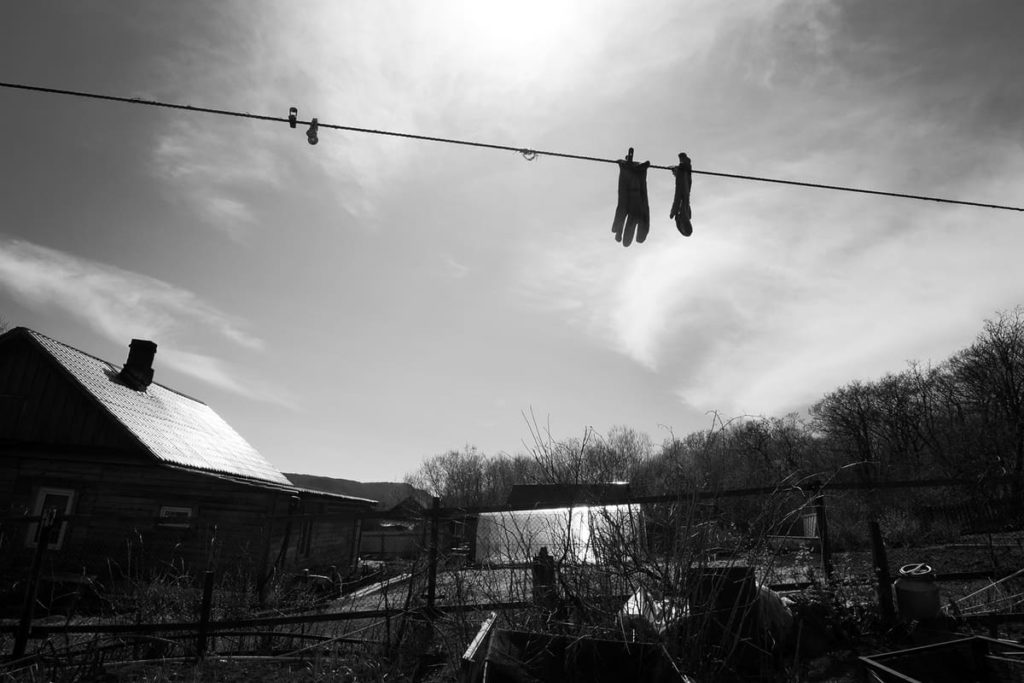
Inna met Oleg in 2010 in Sochi. At the time, he was a welder in a factory and she worked on the construction sites of sports facilities for the 2014 Sochi Olympics. They got married in 2012 and a year later their daughter Karina was born.
Oleg moved to Karachay-Cherkessia because of Inna. The Republic is among the poorest regions of the Russian Federation, but finding work has never been an issue for him. In the early 2010s, Oleg worked as a foreman on a construction site abroad, so, according to Inna, he has always been considered a good specialist in the village.
With no professional education, Inna usually took any job she could: she worked as a maid in a hotel and as a bagger at Wildberries [the largest Russian online retailer]. In 2021 she had to take a job as a cleaner with a 12 thousand roubles salary. Inna’s previous job with a 2-2 schedule didn’t allow her to take care of Alexander, her first husband, who then moved in with them. Alexander is the father of her eldest daughter Olya. They separated 23 years ago when Inna was pregnant. Since then she hadn’t heard from him until he reappeared in her life two years ago.
«When Olya grew up, she started looking for information about him for some reason. And then in 2021, my daughter got a call from a nursing home. They asked her to bring nappies and other basic things, Inna recalls. It turned out that in 2014 Sasha [Alexander] had an ischaemic stroke. After that, he stopped talking, and his daughter from another marriage put him in a nursing home. Olya called me and told me this terrible story. Despite my bad temper, I have a good heart. But I couldn’t take him home without Oleg’s approval. He didn’t agree at first, but then he said that if Sasha was still alive when he returned from his watch, we would take him from the nursing home».
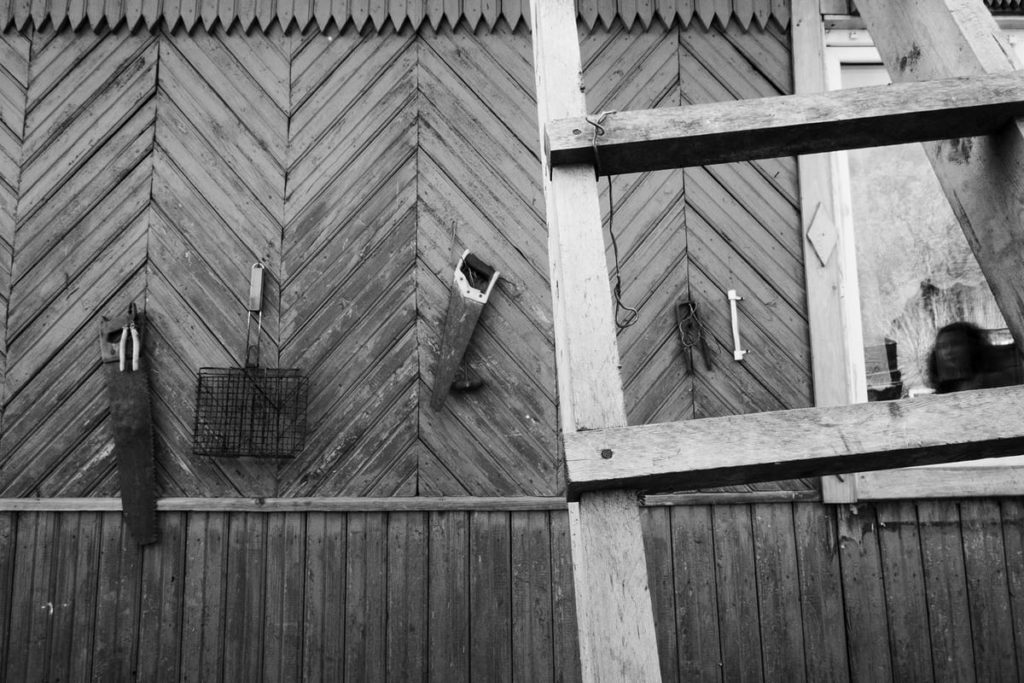
74-year-old Alexander lived to tell the tale. When Inna and Olya arrived at the nursing home, she recalls, her ex-husband was in a «terrible state», not able to walk or talk. On top of the consequences of the stroke, he had septicaemia on his leg, which eventually led to amputation two years ago. Inna blames the management of the institution and the social services. Alexander’s disability pension, which was supposed to pay for his care, «kept disappearing».
Inna filed a complaint to the prosecutor’s office, but after a long inspection, she was told there were no grounds for a case. Alexander’s cousin had also made an appeal to the prosecutor but to no avail. Alexander died at the end of June [NV spoke to Inna when he was still alive]. Inna thinks it was due to internal bleeding, but there’s no confirmed cause of death.
A year before that Inna and Oleg hosted another person in their house, 75-year-old Andrei Kirilenkov. He was injured in the liquidation of the consequences of the Chernobyl nuclear accident. Inna has known Andrei since childhood, he worked at the sovkhoz [a state-owned farm in the Soviet Union] with her mother. When Inna learnt that he was in a nursing home and saw the living conditions there, she couldn’t stand it: so she took him in, too. By that time Andrei was missing one eye, could barely see with the other one and needed assistance 24/7.
The Korovin family received a monthly payment of 1,200 roubles for taking care of Alexander, and another 780 roubles for taking care of Andrei. Now Inna is trying to get him a flat in the village, but so far to no avail: he hasn’t officially been assigned the status of a Chernobyl liquidator. The only pension he receives, 26 thousand roubles, is for his disability.
While Oleg was at home, he helped to look after both men. Inna says her husband is a jack of all trades: at home, he baked bread, helped with cleaning, and changed bandages for Alexander and Andrei.
«He had been a nurse in Yugoslavia during the war. Doctors in our neighbourhood don’t know a tenth of what Oleg knows,» Inna explains.
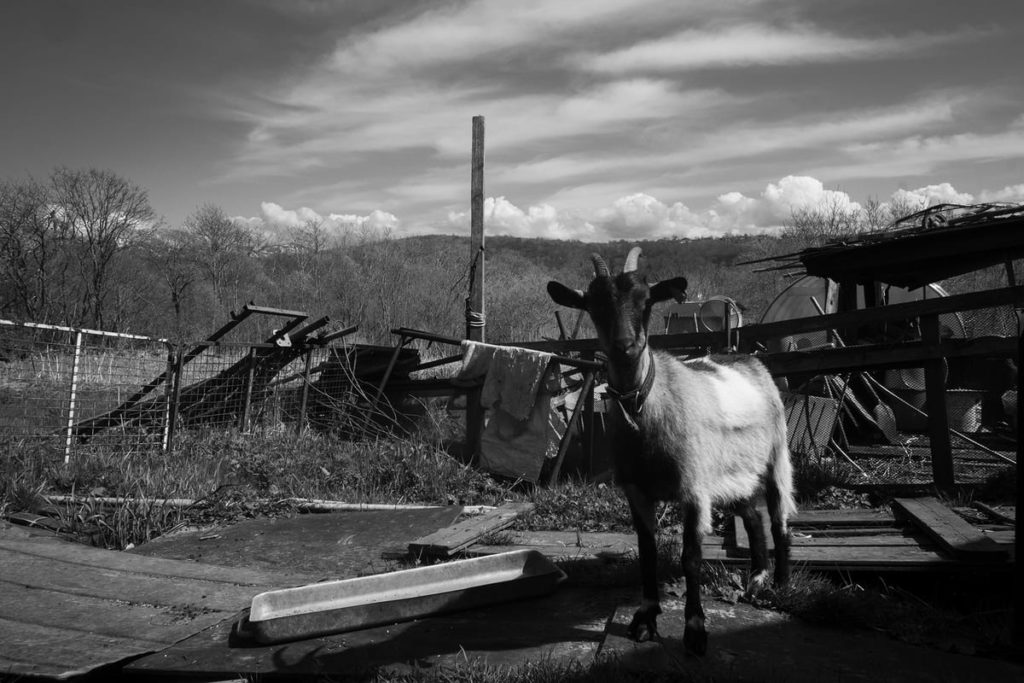
After Oleg left on 24 January to «protect his family», Inna had to quit her job at Wildberries: it was difficult to combine work, house chores, and taking care of her family and two disabled people. After the floods in 2002, groundwater accumulated in the basement of the house, and now every time it rains heavily, the plot of land in front of their house turns into a lake. It has become even more difficult to cope without her husband, so Inna had to pay more than 50 thousand roubles to fill the ground with gravel so that it was at least solid enough to walk on. Their house has long been classified as dilapidated, but no new housing has been provided: the district administration says there is no money.
In early June, when Oleg went to Alchevsk in the Luhansk region after three months of training, he called his wife and said that if he were to die, at least it would be «an honourable death, and my children and grandchildren wouldn’t be ashamed of me». Soon after Oleg was sent from Alchevsk to Budyonnovsk in Stavropol region.
«There they had their self-defence equipment [bulletproof vest and helmet] taken away and were only allowed to keep some water. They did not give away their military IDs, saying they had lost them. Oleg immediately started calling me. A relative of ours works in the Presidential Administration, and I asked him for help. He recommended I put together a list of the people in the unit and send it, along with a letter, to Putin, Shoigu [Minister of Defense], the head of the FSB and the military prosecutor’s office. They received their self-defence equipment back after that,» says Inna.
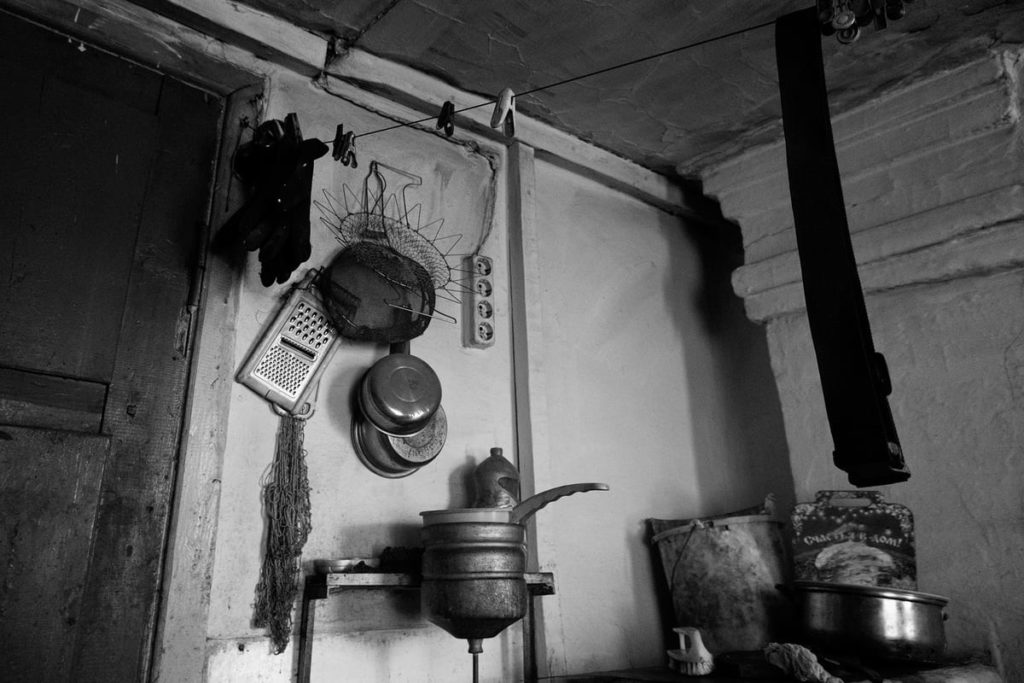
In mid-June, Inna spoke to her husband again. «He said he was in Budyonnovsk, sitting in a dugout. Of the 240 people [in the formation], there were 73 of them left. He told me the plan was to throw them back to the frontline without their military papers,» Inna recounts their conversation. Meanwhile, when she called the military unit in Budyonnovsk, she was told that Oleg was officially declared «missing in action».
«Everyone says Putin knows about all the atrocities in the army. But he doesn’t. So I am very grateful to him for his readiness to help when I really needed it, Inna says. If Putin were to call me right now for a meeting, I wouldn’t think twice but would find someone to look after the disabled and go. I would cover him with kisses from head to toe!»
Inna doesn’t follow the news, she doesn’t watch TV, she just doesn’t have time for it. Before her husband left, it was he who gave her a rundown of what was happening in the war and in the country. They spent about 500 thousand roubles on Oleg’s military equipment from the «army» payments allocated to her husband for the first few months of fighting and the family’s savings. Inna found out soldiers weren’t being provided with all the basic necessities, so she bought some things herself, including an American bulletproof vest for 120 thousand roubles (the best kind, she says), a helmet for 80 thousand and a tent. She hopes that at least a part of the next payment of 195 thousand roubles will be left for the family. As of 12 July 2023, the family has only received half of the payment for the month of May
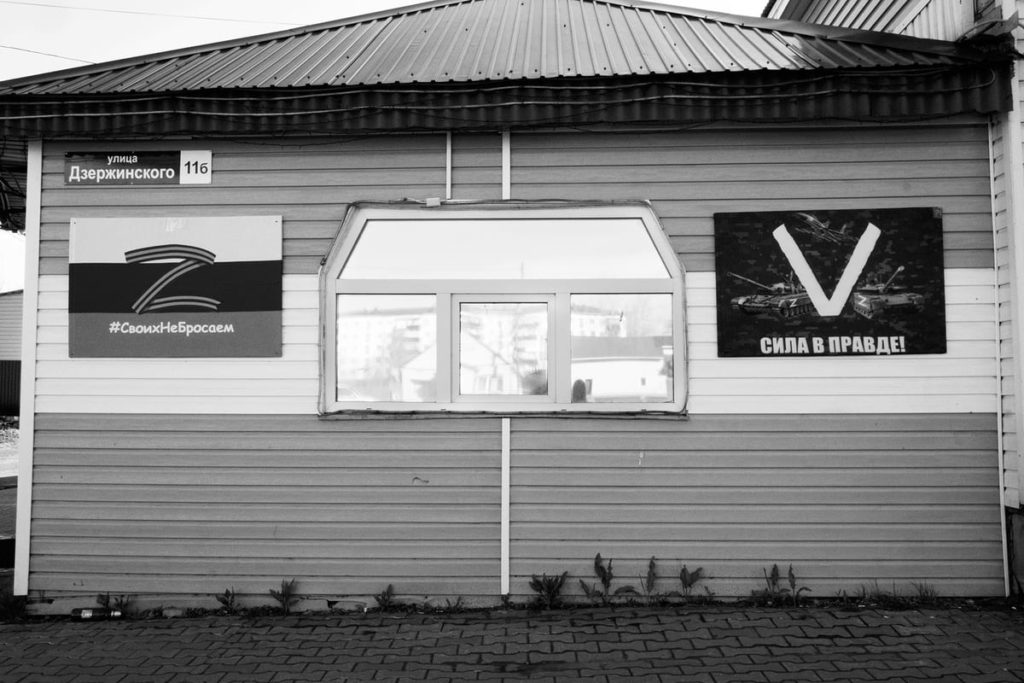
Inna is proud of her husband, she believes that he is saving the country and fighting for a better life for the people of Russia. She is scared, but she finds solace in the knowledge that if her husband dies, his death will not be in vain.
For the first few months, Inna’s daughter Karina kept asking her if her father would come back home as a hero. Inna told her that only real heroes go to the front line: «She also asked if they shot for real there. I was honest with her, I said yes. This often made Karina cry, but I comforted her and told her to pray and hope for the best. Every day we read the Bible and pray for Oleg and all the guys fighting in the war. And for Vladimir Vladimirovich [Putin], too.»
«Daddy’s fighting on the side of good» Amina’s story
«When the war was declared, my husband tried to calm me down, saying that everything would be fine. When it just started, I was very worried, but I wasn’t aware of the real scale. I thought it would only last a couple of days. My husband went to war right away,» says 30-year-old Amina Kurbanova.
She lives in a small village of about 2,000 people in Dagestan, a republic situated in the North Caucasus. The village is well looked after, there are asphalt roads and the houses have gas. This is Amina’s parents’ native village. She was born in the Ryazan region, where the family moved in the 1990s when there were no jobs in Dagestan. But the Kurbanovs had never planned to leave for good and went back to their homeland as soon as they could. Amina was ten years old at the time.
After finishing school, Amina went to university to study legal history but didn’t end up working much in that domain. For seven years now, she has been on maternity leave: she has three sons and a daughter who is a few months old. When the children are older, Amina wants to return to work and teach law at school. Amina’s husband is her cousin on her mother’s side. She doesn’t want to share his name, as he works in the military. Despite being cousins, they were adults when they met each other.
«He asked my parents to marry me many times. For the longest time, they wouldn’t agree, but eventually, he got his way,» Amina says.
The family lives in Amina’s mother’s house. The woman has a profound disability, so Amina and her husband helped her with the household chores. Now Amina takes care of the vegetable garden, the geese, the ducks, the chickens, the children and her mother — alone. Before her husband went to war, he used to help her in the garden and spent a lot of time with the children. Before going to Ukraine, he used to travel a lot for work, too, but at least she could call him and ask for advice, Amina says.
«I used to leave all my husband’s chores until he returned, Amina explains. But now we can’t rely on him, because who knows when he’ll return. Last year the children saw him for a total of 18 days. During this time he even managed to cut the grass in the yard. I feel sorry for him and I don’t want him to work too hard when he’s on leave. So I have to do all the work».
Hiring someone isn’t an option: in Dagestan, it is not customary for a married woman to hire men when her husband is not at home. Her eldest son, who is seven, helps her a little, Amina says. She’s not alone: there are 32 other women in the village whose husbands have left to fight. They don’t talk with each other, though, preferring to cope on their own.
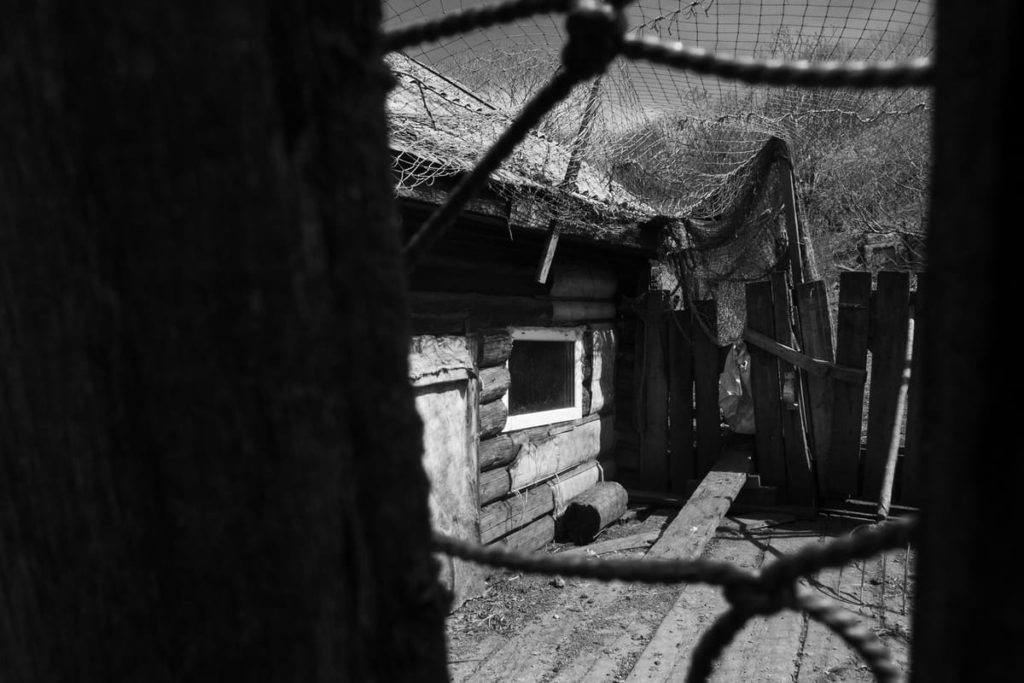
Amina asked her husband not to go to war, but he had a contract with the Ministry of Defence until the summer of 2022. After that, he could have stayed home as a father of many children (he has four). But he went back to war. Amina gave up trying to talk him out of it, as she understood his motives: he wanted to defend Russia from the Nazis, she thinks. Sometimes her husband calls and talks to the children via video chat. First, he was on the front line in the Nikolaev region, then he was sent to Kherson. The following three months, Amina says, were the hardest: her husband didn’t get in touch.
«It was very scary, I watched all the news and searched online to calm myself down and make sure he was ok. Somehow we got through it. Now I understand more or less what to expect. I understand that this war will be long. You can’t get used to these things, but at least you learn to accept. I was still pregnant at the time, so I tried not to harm the baby and to worry less. When I gave birth to my daughter, my husband, unfortunately, was not around. He’s always been there when I came out of the hospital, but not this time. My family was there, but still, it wasn’t the same».
Amina tells her children about the war and their father’s service, but without going into detail. «I tell them that daddy is fighting on the side of good. They are very proud of him. The eldest keeps telling me that when he grows up he wants to join the military too. He draws tanks all the time and wonders why scientists can’t come up with a giant rocket so that we can win immediately. My second son is five years old, and he imitates his eldest in everything. The third is two and a half years old and doesn’t understand his brothers’ games.»
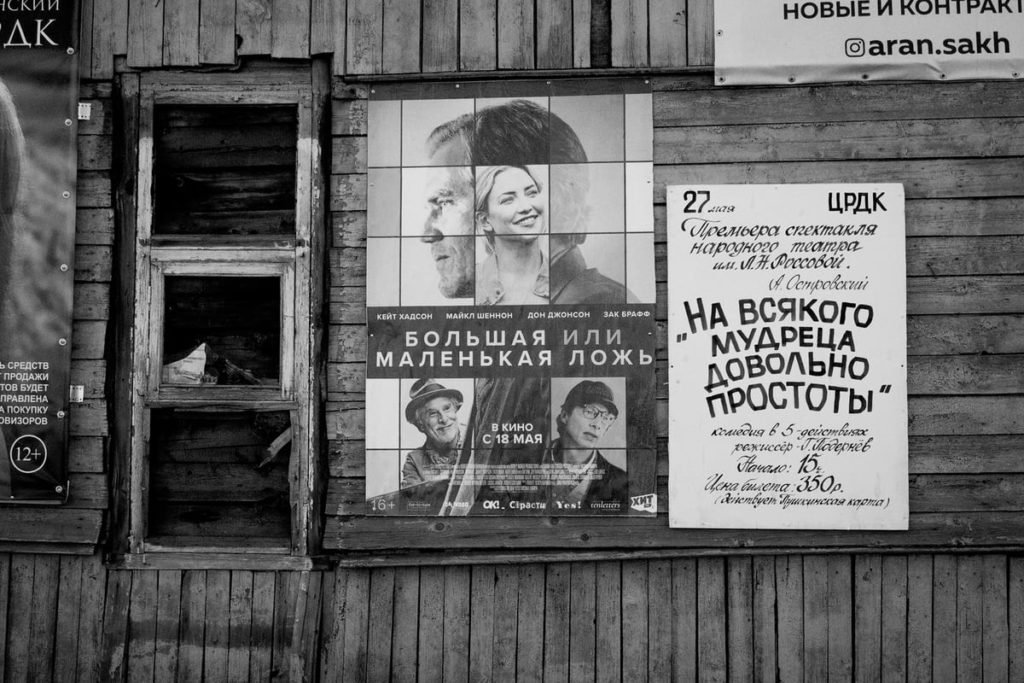
Amina doesn’t complain about the «army» payments that her husband receives. They have increased, she says: before he used to get about 170-180 thousand rubles, but in May they received 200 thousand. Her husband is an intelligence officer and he had to buy night vision devices and binoculars with his own money. The military had the equipment but the quality was poor, Amina says.
Amina constantly reads updates on local Telegram channels and Kadyrov’s [head of the Chechen region] channel and watches TV, mainly Channel One [Russian state-controlled television channel]. She is worried about her husband and needs to know what’s going on. She knows that the Russian media doesn’t give a full picture and getting information from just one source is not enough, she says, so she always double-checks everything in another Telegram channel (she didn’t say which one).
Amina’s opinion on the war hasn’t changed in a year and a half. She is convinced that had Russia not launched an offensive in February 2022, Ukraine would have attacked first: «I see the way children are brought up in Ukraine, the way hatred is nurtured in them. I don’t want it to reach us and affect my children in any way. That’s why, as horrible as it sounds, I support the war. I don’t want my boys to grow up in the Ukrainian world.»
«You can’t trust our fucking government» Oksana’s story
«When my husband got called to the front, it wasn’t unexpected. He kept saying he was going to be taken away. I don’t know why he thought that. But I had prepared a rucksack with clothes and medicines for him in advance. He works at a strategic facility, and the company could have taken care of him, but I guess it wasn’t meant to be. And he has always been a patriot,» says 45-year-old Oksana Serova from Aleksandrovsk-Sakhalinskiy.
Aleksandrovsk-Sakhalinskiy is a town with a population of less than nine thousand people on the western coast of the island of Sakhalin, a stone’s throw away from the Japanese island of Hokkaido. In the 19th century, there was a military post here, named Alexandrovsky in honour of Emperor Alexander II, who turned Sakhalin into a place of exile and penal facilities. The tunnel cut through the rock by the convicts was later also named after the Tsar.
Now all that remains of the rich history of the former capital of Sakhalin is a deteriorating tunnel, a lighthouse and the Chekhov Museum. Three years ago, the city resumed flights to Yuzhno-Sakhalinsk and later put a check-in barrack near the runway for the passengers. But many residents prefer to get to the capital by train or car, as flying with small planes hurts their ears.
There is a supermarket, a cinema, a pharmacy, three schools, three kindergartens, and a medical college in Aleksandrovsk-Sakhalinskiy. Almost every local has a dacha [a house in the countryside], retired men and women sell flowers and berries from their gardens in the city centre. Many of them inherited dachas from their grandparents, who lived in them before moving into five-storey buildings. Oksana Serova also has a dacha, which she goes to almost every day.
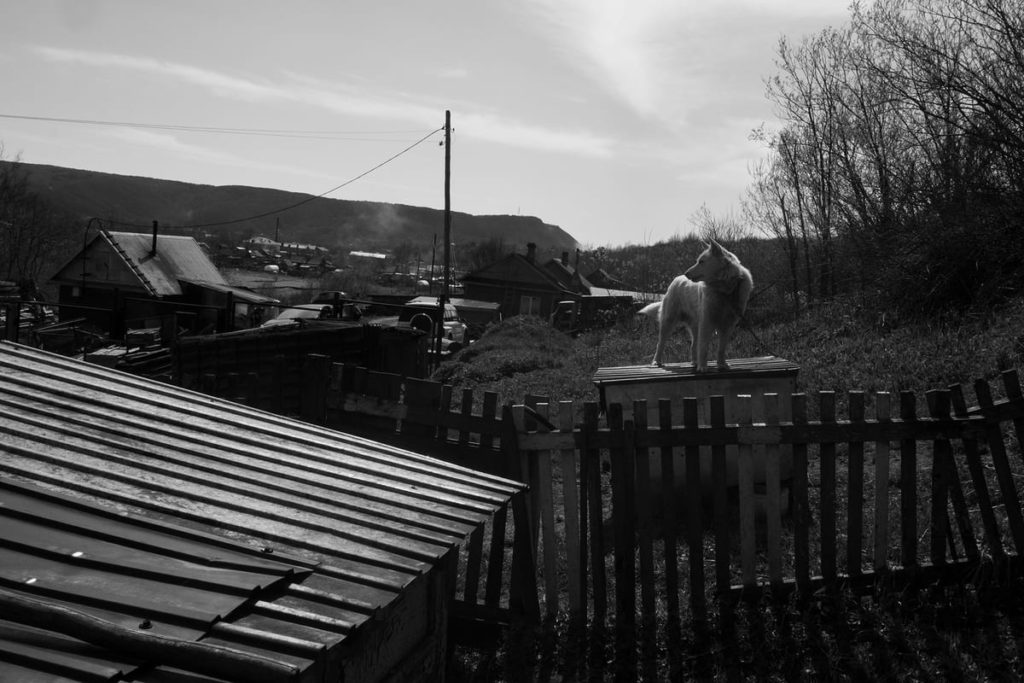
Oksana was born in Samara in southwestern Russia but moved to Sakhalin with her parents when she was three, to the port city of Kholmsk. After her parents divorced, the girl lived with her mother. In the 90s, after finishing school, Oksana didn’t get into one of the university’s free courses, and the family had no money to pay for her education, so she went to work as a fish processor.
«In Kholmsk, if you didn’t have a degree, you could only work at the port. From the age of 18, I would go out to sea on floating vessels, we would work for 12 hours straight and then drink the rest of the time, Oksana confesses. It’s not true that it’s mostly men who go to the seas, there have always been a lot of women there, working at the bar, cleaning. You can’t go anywhere without women. And the saying „a woman on a ship is bad luck“ is just rubbish».
She met Vyacheslav in 2000. Oksana went to work in the village of Lesnoe near Yuzhno-Sakhalinsk during the fishing season, and Vyacheslav had just returned from serving his mandatory military service.
«Slava was a child of the 90s like me: his parents didn’t provide him with everything he needed. We stayed for the autumn fishing season, got to know each other, lived together for two years, and got married in 2004. A few months later Masha was born. Five years later we had our second daughter, Anya. My husband’s grandfather is a Hero of the Soviet Union, so reporters come to visit us almost every year, and we get invited to the local museum on Victory Day», Oksana says.
«I wrote an essay about my great-grandfather in 2020. I won first place, I got the prize,» 19-year-old Masha interrupts her mother.
After the wedding, Oksana moved in with Vyacheslav in Alexandrovsk-Sakhalinskiy. Her husband went out to sea on shifts and recently worked as a shift foreman at the «kochegarka» (a nickname locals gave to the central district boiler house). Ten years ago, at the age of 35, Oksana graduated from the local medical college, she went there to study to eventually get a better-paid job. Since 2015, she has been working shifts as a nurse at the hospital.
«I have a 2-2 or 1-3 shift schedule. But in general, I’m already tired. As soon as I can retire, I will leave immediately», Oksana says.
«I also went to medical school: my mum insisted since I didn’t want to go anywhere really», Masha adds.
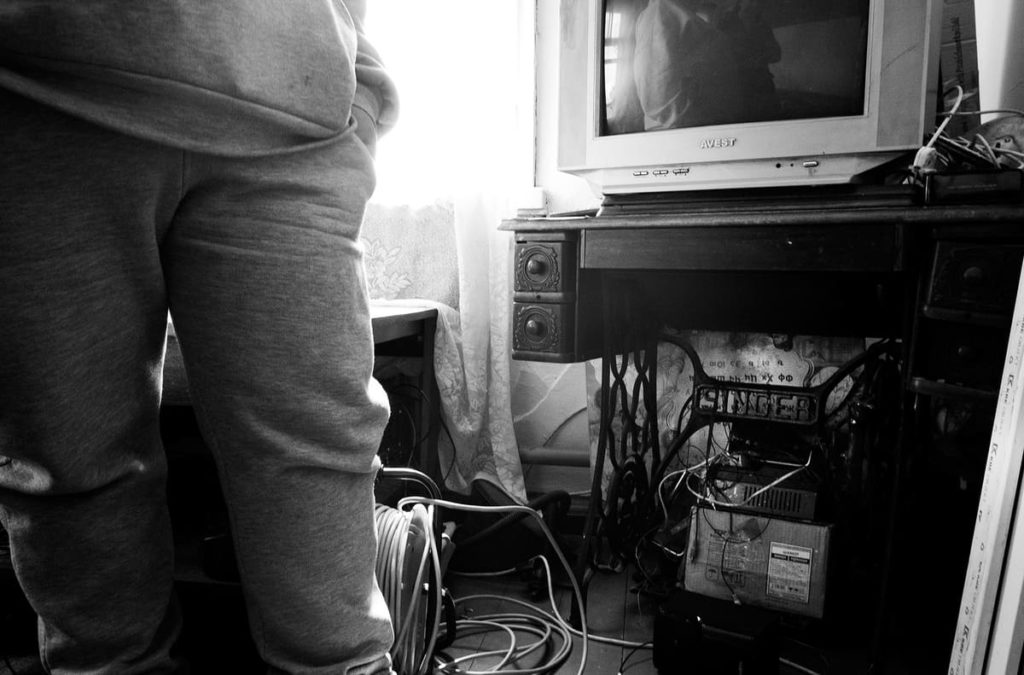
Oksana’s husband Vyacheslav Serov was handed a summons near the military enlistment office when he went to see off a mobilised friend on 24 September 2022. The same day he took a pre-prepared rucksack from home and left for Yuzhno-Sakhalinsk for training. Her husband didn’t ask his family’s opinion, Oksana says, he believed he had a duty to the Motherland. In October 2022 Vyacheslav was sent to Olgovka, Kherson region, to work as a driver, and on 19 May 2023 he was sent to the front line.
«We keep in touch every day, he sends videos and photos, Oksana says. He works there as a driver. Recently they put machine guns on top of his car, but someone else fires them. He’s a lucky guy, so we try not to think that something bad might happen to him».
In the spring of 2023, Oksana had a stroke. She thinks it’s because of the constant stress at work and worrying about her husband. She has been walking slower since, and it takes her longer than before to do ordinary things. Oksana was on sick leave for two and a half months, before taking some time off. All this time she and her daughter lived mainly off her husband’s army salary. According to Oksana, her wage depends on the shift schedule: if she works a 1-3 schedule, she earns about 50 thousand roubles. In Sakhalin, considering local food prices, this is very little.
«If you also work part-time somewhere else and take up extra shifts, you can get 100 thousand roubles. But it’s hard to work on a 1-3 schedule, there’s no time to do anything around the house. Only to sleep, that’s it,» Oksana explains.
She adds that in the first months after he was mobilised, her husband didn’t get paid, so she and her daughters lived off her salary only. Then Vyacheslav started to receive 100-120 thousand rubles, but half of this goes to pay for his food, clothes and equipment.
«The soldiers have to buy their own clothes, the state doesn’t provide anything. Maybe they provide food, but I doubt it. At the same time, we have so many volunteers in the country. They are always bragging about these parcels they sent to the front, but all of it gets lost somewhere and doesn’t reach the military. I volunteer in an organisation myself, but we only collect money and send it to the men. Once we sent my husband a parcel with the help of volunteers. It had been in transit for three months, and when it arrived in Ukraine, the locals asked him to pay 100 thousand rubles for it».
Before leaving, Vyacheslav worked hard at the dacha: chopping wood, heating the oven in the house, looking after the chickens, digging up garden beds, and harvesting. Oksana was responsible for cleaning and cooking. After her husband went to war, she hired a handyman to help her at the dacha.
«But the man got drunk and my mum threw him out,» Masha says. «Yes, I kicked him out, and he decided to take revenge and stole all the chickens! Oksana says angrily. And these chickens belonged to my grandmother. Alexandrovsk-Sakhalinskiy is a small town, it’s not hard to find a thief, so the man killed the chickens. We only have five hens and one rooster left».
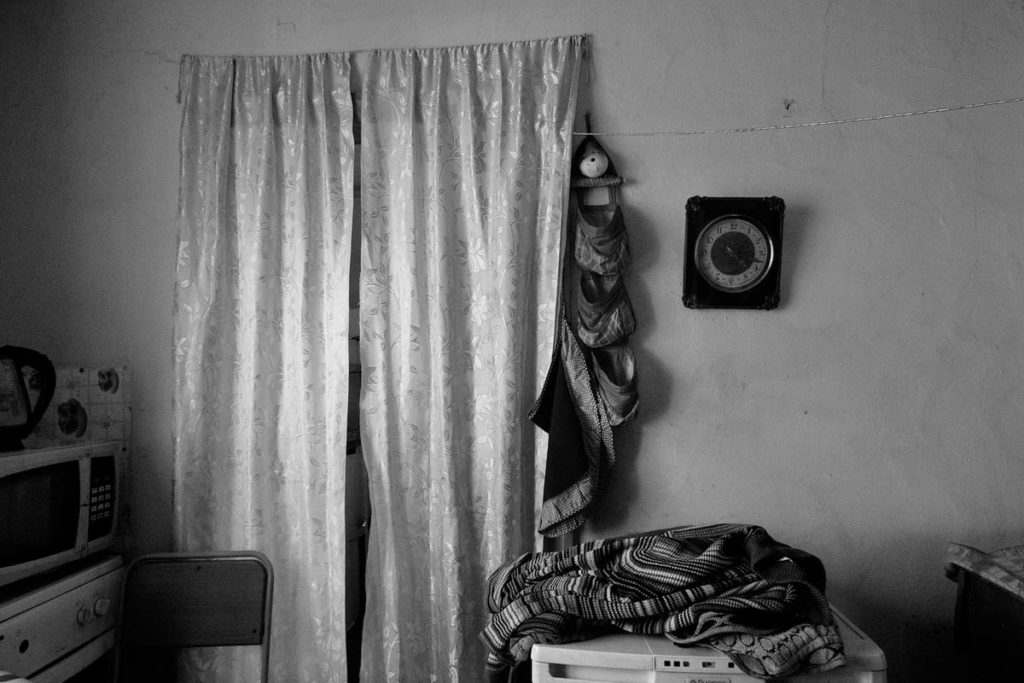
The administration of Alexandrovsk-Sakhalinsky helps her family. On New Year’s Eve, the youngest daughter, 14-year-old Anya, was given a 1TB hard drive. They also brought them coal, but it was bad quality and didn’t burn.
Before her husband was mobilised, Oksana didn’t read news about the war, there was too much work to do. She felt sorry for the people of Ukraine and was angry with the government, which didn’t know what it was doing. Oksana used to hardly watch TV before, but after 24 February 2022, she started reading news on the Telegram channels managed by the Ministry of Defence and Prigozhin [head of Wagner military group] and finding out about what was happening from her cousin who lives in Belgorod [a town on the Russo-Ukrainian border]. After her stroke, she stopped reading Telegram channels too, and since Vyacheslav left, she only believes what he tells her personally.
«My husband says Russia doesn’t have its own equipment. They’re just sitting in the trenches there, waiting for missiles to strike. And in the news, they tell us that everything is fine and that we will win. You can’t trust our fucking government after that!»
Vyacheslav recently told Oksana that many of his fellow soldiers are in a difficult emotional state and depressed. Oksana feels that her husband is fed up with the war, but he will never say on the phone that he went to «defend the Motherland» for nothing. She herself could not understand the point of this war and the point of all the killings from the beginning, and she has only become more confused since.
«I feel bad for Russia, which has no equipment and every day someone dies because of this. My husband was also supposed to be sent on leave after six months of work, but it’s been eight months now. It’s unclear when he’ll be able to come back. He’s hoping for December unless the war ends sooner. If my husband doesn’t come back, I will go to Yuzhny [local nickname for Yuzhno-Sakhalinsk]. There’s nothing to do in Alexandrovsk. Anya and Masha will definitely leave town, and I don’t want to stay here alone», Oksana says.
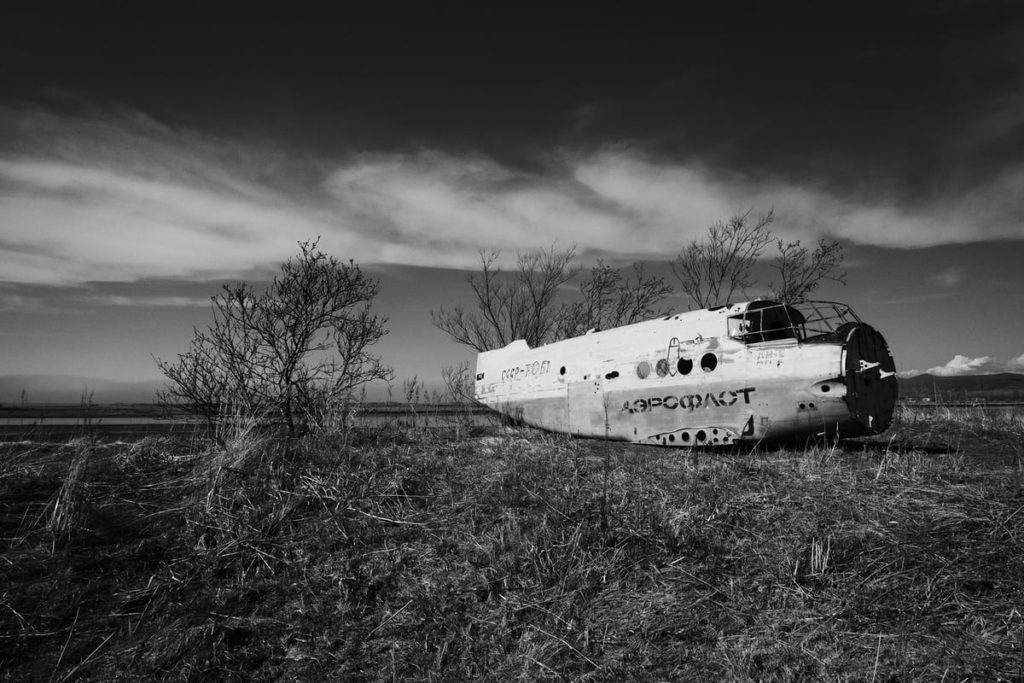
Two poodles keep Oksana’s spirits up: the black one, Jack and the white one, Jenny, as well as a neighbour in the dacha, Natalia, whose youngest daughter studies with Anya. Jack and Jenny have recently had two puppies (Oksana breeds and sells them). Natalya works as a manager with the social services, her husband Denis is also fighting in Ukraine. Natalya has even more work to do at the dacha than Oksana: an enclosure with rabbits, two goats, a bunch of chickens, garden beds and a greenhouse.
«I used to mainly take care of the garden beds, while my husband looked after the house and the animals. He always came home late from the dacha. That day he came back around midnight, a man in a police uniform knocked on the door and handed me a summons, Natalia says. Our daughter burst into tears immediately, and my husband told me that he wasn’t a coward or a deserter, so he would go to war. He left Aleksandrovsk on 22 September and flew to Ukraine on 17 October. We keep in touch with him, he never tells us any bad news. According to his words, everything is good, and «victory will be ours».
Since their husbands were mobilised, Natalia and Oksana have grown even closer and started spending more time together. They like to sit in the anteroom at the dacha and discuss local gossip. Oksana smokes countless cigarettes, and Natalia sits there, smiling. Both try not to think about bad things.





